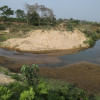Winds of winter and elections bring little joy to tea stalls

At 9:00am on a chilly and foggy winter morning, 60-year-old Sheikh Sadi's hands were busy stirring a cup of tea in his makeshift tea stall in the port city's Agrabad area.
The sexagenarian appeared annoyed, both by the fact that he had to wake up early in the mornings to prepare his concoctions and because sales the previous night had fallen below expectations.
"I had to stop sales around 11:00pm last night instead of the usual closing time of midnight because people are not keen to stay outside late during these frigid nights," Sadi repeated as he scurried to serve four customers at a time.
Every morning, his son and staff set up the stall. They are ready to start selling by 8:00am, hoping to reel in customers, mostly traders from the adjoining kitchen market who return with fish and vegetables from wholesale markets looking to relax while enjoying tea, snacks and conversation.
Usually, tea sales scale up dramatically in the winter as people drink more of the beverage to stay warm.
Adding to Sadi's expectations of heightened sales this time around is the fact that the elections are knocking at the door this winter.
However, the hustle and bustle of electioneering has been absent in most localities, leading to lack of crowds at tea stalls.
The usual enthusiasm of election is not there this time as the major opposition party is not participating, said the tea seller, who has experienced the buzz of a number of elections from his roadside stall for the past two decades.
Before winter, Sadi sold on average 200-250 cups of tea daily. This winter, only 20 to 30 additional cups are being sold, he said.
Sadi sells three types of tea: tea with powdered milk, tea with condensed milk, and lemon tea.
He hiked prices of all types of tea by Tk 2 four months ago due to rising prices of sugar and milk and is now selling a cup for Tk 13, Tk 12 and Tk 8 respectively.
He opined that people were having less tea due to the financial strain caused by higher prices of essential commodities.
Minhajur, a rickshaw-puller who arrived at the stall, said he used to have three to four cups of tea daily in the past, but now has to limit himself to one or two cups, lamenting the fact that four cups would cost over Tk 50.
A similar scenario was seen in other areas such as East Nasirabad, Prabartak, and Kajir Dewry.
Muidul Hossain, a footpath tea stall owner at the busy Prabartok Moor, said he used to sell at least 100 additional cups of tea every winter, but had noticed no remarkable rise in sales this time around.
Tea traders also spoke of low demand this year, saying that economic pressure on people due to high inflation had led to lower demand for the beverage, which is not considered an essential.
Shah Moinuddin Hasan, chairman of the Tea Traders Association of Bangladesh (TTAB), said tea sales in weekly auctions so far this year were down by around 3 million kilogrammes compared to last year.
Hasan mentioned that most tea remains unsold in the weekly auction mainly due to low demand and lackluster quality of tea, adding that almost half of the tea being offered in auctions are not of good quality.
He also blamed high inflation for low demand.
Many prefer lemon tea instead of milk tea due to lower costs, which has contributed to lower demand since lemon tea uses less tea leaves, the TTAB chairman added.
Ispahani Tea Limited General Manager (Marketing) Omar Hannan also gave the same impression, saying that the price of tea leaves did not increase, but prices of complementary goods such as sugar and milk had risen.
Tea sellers in many areas are also reducing cups sizes to balance sales, which ultimately results in lower consumption of tea.

 For all latest news, follow The Daily Star's Google News channel.
For all latest news, follow The Daily Star's Google News channel. 








Comments